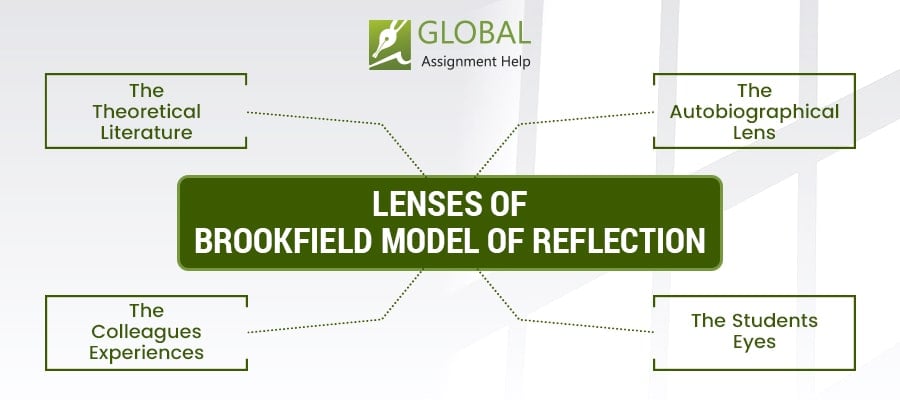What is Brookfield Reflective Model? Guide on Its 4 Lenses
05 Mar 2024 3708 11 minutes
Table of Contents
- What Is the Brookfield Reflective Model and Who Developed It?
- Understand 4 Lenses of the Brookfield Reflective Model?
- What Are The Advantages and Disadvantages of the Brookfield Reflective Model?
- What Are Alternatives for the Brookfield Model of Reflection?
- Still Facing Issues in Understanding Brookfield Model of Reflection? Contact Us
Everyone has to do critical self-reflection to analyse their ideas and work. For this, they can use the Brookfield Model of Reflection. In this blog, you will come to know it in detail. With this, you also learn about the types of lenses that help you understand things from different angles. Moreover, this blog will answer your query, “What is the Brookfield Reflective Model?” So, without wasting more time, let's move ahead and understand the meaning of this method.
What Is the Brookfield Reflective Model and Who Developed It?
The Brookfield Model of Reflection is a technique that teachers use to determine the value of their teaching through critical self-reflection. When teachers reflect on their teaching, they can explain the concepts to others effectively. Also, you can judge education approach, evaluation, planning, and design of learning plans and assessments. For this, the teacher should use four lenses of the Brookfields Reflective Model. So, these are
1. Autobiographical lens
2. Students’ eyes
3. Colleagues' experiences, and
4. Theoretical literature.
The Brookfield Model of Reflection was created by Stephen Brookfield in 1995. In his teaching career, he taught in various countries such as England, Canada, and the United States. Moreover, he wrote 19 books on subjects like critical thinking, methods of discussion, and critical theory. His main aim has always been to help adults to assess the ideas that each person has internalized.
So, in this section, you learn the meaning of the Brookfield Model of Reflection. With this, we move to the next part of the blog and understand its four lenses of it.
Understand 4 Lenses of the Brookfield Reflective Model?
According to Brookfield, a teacher should understand things from four different angles. For this, he names them as Brookfields Lenses of Reflection. Also, with the help of this, it becomes easy to assess the value of the teaching method. So, now we discuss these types one by one.
1. The Autobiographical Lens
It is the first among Brookfield’s Four Lenses. In it, the teacher has to understand their own experiences with the students about education and learning. Thus, with the help of this analysis, it becomes easy to identify how people learn.
Activitiesin the Autobiographical Lens:
1. Learning and Teaching Philosophy
2. Recordings
3. Teaching Logs
4. Audits
5. Advice
2. The Students' Eyes
Along with self-reflection, it is crucial for teachers to understand the students’ experiences. With this analysis, it can be identified whether there is a need to adjust the power relationship or not.
Activities in the Student's Eyes:
1. Formal evaluations
2. In-class evaluations
3. Focus groups
4. Interviews
5. Letters
6. Questionnaires
3. The Colleagues' Experiences
Along with focusing on the above two Brookfields Critical Lenses, it is vital to discuss with peers or colleagues related to mentoring, advice, and feedback. So, with the help of it, teachers can share their experiences with others and know that they are not the only ones who are making mistakes.
Activities in the Colleagues’ Experiences:
1. Learning circles
2. Collaborative problem-solving
3. Critical conversations and evaluations
4. The Theoretical Literature
Theories help teachers to gain new insights and better understanding. So, you have to relate your reading with the other three lenses. By doing this, you can identify your next step. Also, it helps you identify how you will apply your knowledge to practice.
Activities in the Theoretical Literature:
1. Conferences
2. Professional journals
3. Research
So, above are the four lenses of the Brookfield Model of Reflection thatyou read. This information helps you assess your teaching method and can help you make adjustments to it so that you can explain things efficiently to others. With this, we move to the next part of the blog and discuss the benefits and drawbacks of the Brookfield Model of Reflection.
Students Also Read: Kolb Reflective Cycle
What Are The Advantages and Disadvantages of the Brookfield Reflective Model?
Brookfield 1995 Reflective Model is an effective tool for teachers to evaluate their teaching methods. With the help of it, you can also make changes in your teaching style to teach students effectively. However, it has some advantages and disadvantages that you need to consider.
Advantages of Brookfield Reflective Model
Let’s first understand the benefits you can get by using the model. So, these are:
1. Foster Professional Growth
By using Brookfield's Lenses of Reflection, teachers can analyse their weaknesses and strengths. So, for this, you use reflective practices that boost professional development.
2. Scope for Innovation
You have to keep track of lessons after teaching. With this, note the positive experiences and challenges you face. Then, take time to solve the problems by applying different techniques. As a result, it leads to innovation.
3. Facilitates Ways to Teaching
When you use Brookfields 4 lenses, you can ensure learning experience is good for every student. It helps you understand what interests students. Based on this, you can make changes in your teaching method so that you can explain concepts to them in an easy-to-understand manner.
4. Boosts Student-Teacher Relationship
Teachers value their bond with the students. The reflective practice process helps you to understand them better. Thus, it leads to a boost relationship between them.
So, these are the advantages of the reflective model. Now, we will discuss its disadvantages.
Disadvantages of Brookfield Model of Reflection
Just like everything has two aspects similarly, the reflective model also has some drawbacks. These are:
1. Difficulty in Understanding Process
Not every teacher can understand the process of the model. To examine your teaching method, you have to use critical thinking and problem-solving skills. For some teachers, it can be quite challenging.
2. Create Confusion for Aspect reflection
The method can also cause confusion about which point to reflect on. Every situation needs different techniques to deal with. So, if you do not know which method to apply in a specific event, you get confused.
3. Time-Consuming
Brookfield Model of Reflection is a time-consuming process. To make changes in your teaching method, you have to apply a technique that can take time if you are not aware of it from the beginning.
Hence, these are the Brookfield Reflective Model advantages and disadvantages. With this, we move to the next section and discuss the alternatives to this method.
You can this check - What is Brookfield Reflective Model? Guide on Its 4 Lenses
What Are Alternatives for the Brookfield Model of Reflection?
In this section, you will learn about the alternatives of the Brookfield Reflective Model. As no one approach is suitable for every person, so for this reason, you have to try different methods that suit you. Thus, below are some models of reflection that you can use.
1. Driscoll Reflective Model
Driscoll created Driscoll Reflective Cycle in 1994, 2004, and 2007 and it is one of the simplest models you have seen. In it, three stem questions were asked. These are: What? So What?, and Now What? He connected these questions with the experiential learning cycle. So, when you answer these questions, you can analyze your experiences and learn from them.
2. Rolfe Reflective Model
The Rolfe Reflective Model aims to support teachers to reflect on their experiences, and actions, and develop practice according to it. This model works as a “How to Reflect” guide for teachers. In it, questions are asked to describe an event, analyze the problems, and consider future possibilities. So, with the help of it, you can gain new insights.
3. Gibbs Reflective Cycle
In Gibbs Reflective Model, you have to examine the feelings of individuals. Also, you should identify how it impacts the situations and reflection of experiences. For it, you use prompt questions at each stage so as to create a fully structured analysis. However, this method does not include in-depth questions.
Thus, these are the alternatives to the Brookfield Model of Reflection. You can use them according to your suitability. We hope by reading this blog, you clearly understand the model. However, if you still face issues with this, you can get help from our experts.
Still Facing Issues in Understanding Brookfield Model of Reflection? Contact Us
This blog has helped you to know the Brookfield Reflective Model and four types of lenses. However, if you want personalized assistance, you can get assignment help from our experts. Our professionals will give you the best quality service. Also, we provide a free plagiarism checker to you so you can ensure that your academic work is unique. So, what are you waiting for, contact our experts today and get the best assistance from us.
Free Tools

Paraphrasing Checker Tool
Easy to Use Paraphrasing Tool to Simplify Complex Academic Writing
Check Now
Dissertation Outline Generator
Get Structured Outline by Professionals for Your Dissertation
Check Now
Referencing Tool
Effortlessly manage citations and references with our smart referencing tool
Check NowLowest Price Guarantee
Get A+ Within Your Budget!Price Calculator
Offers & Benefits
Get upto 56% OFF on Your First Order !
Offers Benefits
Other Services
Latest Blogs

- 20 Mar 2025
- 343 Views

- 04 Mar 2025
- 393 Views

- 28 Feb 2025
- 469 Views

- 25 Feb 2025
- 279 Views















Thank you for submitting your comment on this blog. It is under approval. We will carefully review your submission and post it on the website.